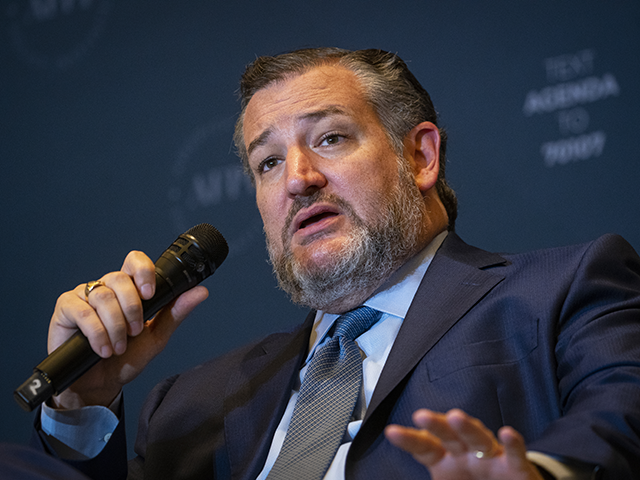Supporters of the Journalism Competition and Preservation Act (JCPA), a bill that would allow corporate media companies to band together in a cartel to collude with Big Tech companies like Facebook and Google, are mounting a last-ditch effort to pass the bill before Republicans take control of the House of Representatives next year, including the undemocratic possibility of adding the JCPA to a so-called “must pass” bill like defense spending.
Crucially, a new version of the JCPA set to be introduced in the House of Representatives includes a massive loophole allowing the corporate legacy media cartel to collude with tech companies on censoring their competitors, in addition to the financial handouts from Big Tech companies to Big Media companies that supporters of the bill somehow consider to be its number-one selling point.
The possibility of the media colluding with Big Tech on censorship nearly killed the bill in the Senate, only for it to be rescued at the last minute by an amendment from Sen. Ted Cruz (R-TX). The limp-wristed amendment prevented formal discussions on censorship, but still left the door wide open for the exclusion of conservative media.
The new House version of the bill undermines even that small concession, empowering the media cartel to negotiate with Big Tech regarding not just the pricing of content from cartel members, but also the “terms and conditions” under which it is displayed.
“Terms and conditions” could include almost anything, including the prioritization of content from cartel members over sources the cartel deems to be “unreliable,” “low-quality,” “misinformation,” or any of the other purportedly viewpoint-neutral excuses that are regularly brandished as an excuse to exclude and censor independent media.
Politico’s Morning Tech reports that the JCPA’s supporters are staking everything on a final Hail Mary attempt to pass the bill in the lame duck session, with the likelihood of passage described as “slim but not implausible.”
If the JCPA is to pass, Politico suggests that lawmakers might have to take the controversial step of adding it to a “must-pass” bill, like defense spending, which would effectively bypass a genuine process of deliberation about the bill’s merits on the floor.
Sen. John Kennedy (R-LA), the bill’s Republican co-sponsor in the Senate, told Politico that he hoped there would be a “little more floor time than some people think” to debate the bill. Politico struck a doubtful tone, noting the difficulty of obtaining floor time in a lame-duck session.
On top of normal difficulties, the new House bill makes the problem at the heart of the JCPA even clearer: it empowers and enriches the world’s wealthiest and most powerful media companies.
The bill also allows any news company to join a new cartel within 60 days of the announcement of its formation, meaning national conglomerates that own multiple outlets can dominate any new cartel by flooding it with members. Companies like Hearst, Gannett, Axel Springer SE, and Newscorp — all of which have pushed hard for the bill — would dominate decision-making in cartels, while small companies that do not own multiple news outlets would have virtually no sway.
The new House bill also attempts to address the concerns of left-wing Democrats, who expressed concerns that the massive handouts the bill would secure from tech companies would go into the hands of media executives, not frontline journalists.
The new bill seemingly attempts to address that, mandating that 70 percent of all payments go to “news journalists.” But the bill’s definition of “news journalist” is drawn so broadly (it includes “producing” and “publishing” news in addition to collecting and presenting it) that highly paid executives and publishers could easily argue that they fit the criteria.
Even if just 30 percent of the Big Tech handouts were distributed to executives, this would still be a massive payout relative to the one received by frontline journalists, given that the number of executives at media companies tends to be in the single or low double digits, compared to hundreds or thousands of regular journalists.
Aside from financial handouts to already-wealthy media giants that regularly smear conservatives, a key complaint from top Republicans including Kevin McCarthy, Steve Scalise, Jim Jordan, Marsha Blackburn, and Tom Cotton is that the JCPA will result in more censoring and sidelining of conservatives.
Sen. Cruz amended the Senate bill to limit negotiations just to price, and subsequently lent his support to the media bailout bill, shocking conservatives who have spent years being smeared by the same media industry that Cruz now wants to enrich.
But even without the new House bill that specifically undermines Cruz’s goal, his amendment did not prevent conservative media from being excluded. As previously reported, the bill empowers media companies to exclude members based on virtually any criteria.
Via Breitbart News:
Specifically, the new JCPA contains a provision that allows “eligible” media companies forming a cartel to “create admission criteria for membership unrelated to the size of an eligible digital journalism provider or the views expressed by its content, including criteria to limit membership to only eligible publishers or only eligible broadcasters.”
That provision is significant especially for its specificity. These mainstream and left-wing media cartels may not exclude based on size or “views expressed by its content.” But that is not how the exclusion happens or will happen.
These self-appointed mainstream and left-wing media cartels ARE allowed to exclude based on the usual, totally subjective, factors they always do, such as: “trustworthiness,” “fake news, “extremism,” “misinformation,” “hate speech,” “conspiracy,” “correction policy,” “expertise,” “authoritativeness,” etc.
Even if there was a way to limit formal negotiations between the media cartel and Big Tech to price, there is no way to prevent the effects of the informal ties that will develop between the cartel’s representatives and companies like Google, Facebook, and Twitter. An already-corrupt relationship, in which Big Tech companies voluntarily devote billions of dollars to propping up the corporate media, will become more corrupt – something Senator Cruz knows.
The discredited legacy media is desperate to pass this bill. The JCPA’s supporters, funded by big lobbying bucks from media giants, have been trying to pass the bill through the House and Senate since 2021.
With vast amounts of Big Tech money at stake, lobbyists have repeatedly revived the bill from the dead after earlier efforts failed, with experts and journalists from across the partisan spectrum highlighting that the bill is simply a bailout for the nation’s largest and wealthiest media companies.
Media lobbyists are pushing for the bill despite the fact that their companies already receive massive handouts from the tech giants: billions of dollars from Facebook and hundreds of millions from Google. In addition, both tech giants have a documented track record of favoring the legacy media in their algorithms, while suppressing the independent media.
The bill, aimed at tilting the playing field even further towards the legacy media, is opposed by the Republican leadership in the House, including Reps. Kevin McCarthy, Steve Scalise, and Jim Jordan.
In the Senate, the bill is opposed by Sens. Marsha Blackburn, Marco Rubio, Mike Lee, Josh Hawley, Thom Tillis, and Tom Cotton.
Allum Bokhari is the senior technology correspondent at Breitbart News. He is the author of #DELETED: Big Tech’s Battle to Erase the Trump Movement and Steal The Election.


COMMENTS
Please let us know if you're having issues with commenting.